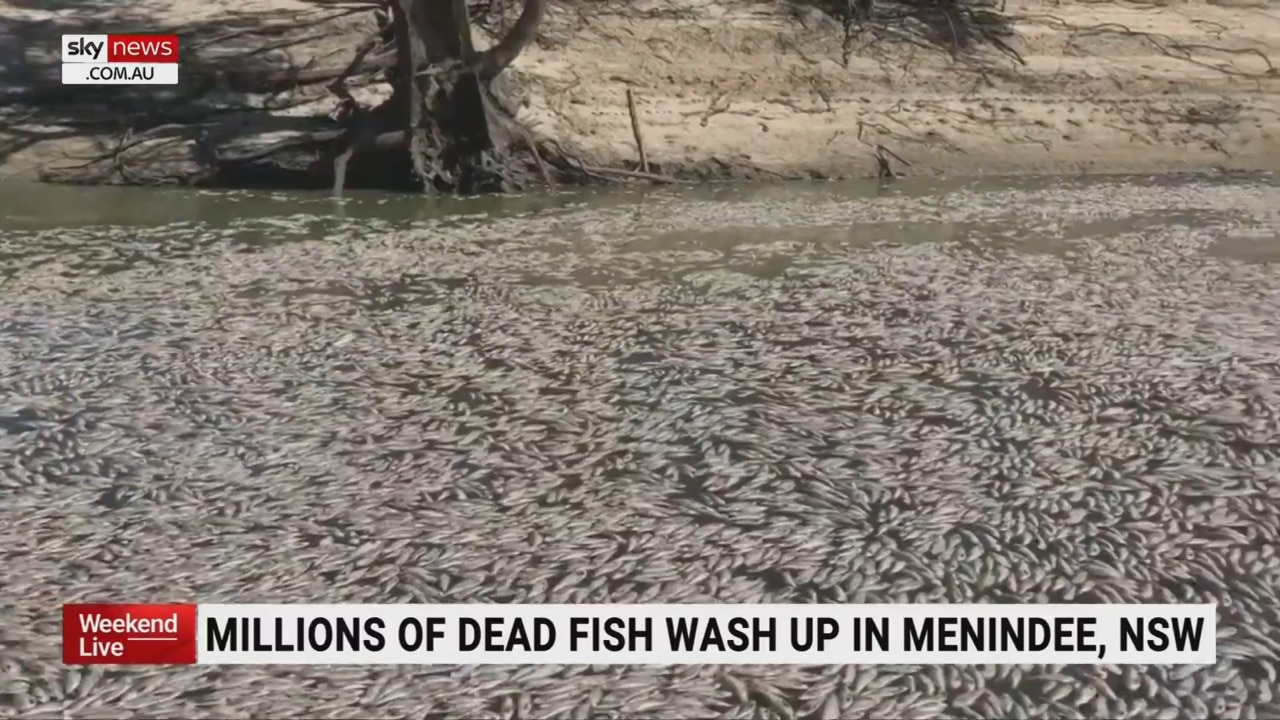Millions of fish died in the Darling River near Menindee following a searing heatwave
Residents of a remote Australian town have expressed concern for their water supply after millions of dead fish appeared in a vast stretch of river nearby
READING LEVEL: ORANGE
Millions of dead and rotting fish clogged a vast* stretch of river near a remote town in the Australian outback as a searing heatwave swept through the region last week.
Videos posted to social media showed boats ploughing through* a blanket of dead fish, with the water barely visible underneath.
The New South Wales government said on Friday that “millions” of fish had died in the Darling River near the small town of Menindee, in the third mass kill* to hit the area since 2018.

“It’s horrific really, there’s dead fish as far as you can see,” Menindee local Graeme McCrabb told AFP.
“It’s surreal to comprehend,” he said, adding this year’s fish kill appeared to be worse than previous ones.
“The environmental impact is unfathomable*.”
Local nature photographer Geoff Looney told the Associated Press (AP) the “terrible smell” from the dead fish was overwhelming.
“I was worried about my own health,” he said. “That water right in the top comes down to our pumping station for the town. People north of Menindee say there’s cod and perch floating down the river everywhere.”

Populations of fish such as bony herring and carp had boomed in the river following recent floods, according to the state government, but were now dying off in huge numbers as floodwaters receded*.
“These fish deaths are related to low oxygen levels in the water (hypoxia*) as flood waters recede,” the government said in a statement.
“The current hot weather in the region is also exacerbating* hypoxia, as warmer water holds less oxygen than cold water, and fish have higher oxygen needs at warmer temperatures.”
Police established an emergency operations centre in Menindee to co-ordinate a massive clean-up this week.

State Emergency Operations Controller Peter Thurtell told AP the immediate focus was to provide a clean water supply to residents.
“There is no need for community concern as the initial assessment has determined multiple viable* solutions to maintain water supply to the Menindee township and surrounds,” he said.
State agencies also started to release higher-quality water where possible to boost dissolved* oxygen levels in the area.
Previous fish kills at Menindee — about 12 hours’ drive west of Sydney — have been blamed on a lack of water in the river due to prolonged* drought, and a toxic algal bloom* that stretched over 40km.
Menindee has a population of some 500 people and has been ravaged by both drought and flooding in recent years.
GLOSSARY
- vast: very great in size
- ploughing through: to go through a substance or an area of something with difficulty
- mass kill: sudden and unexpected mass mortality of wild or cultured fish
- unfathomable: incapable of being fully explored or understood
- receded: to go or move away; retreat
- exacerbating: make a problem or bad situation worse
- hypoxia: low levels of oxygen in body tissues
- viable: having a reasonable chance of succeeding
- dissolved: to be absorbed or to cause a solid to be absorbed by a liquid
- prolonged: to lengthen in time
- toxic algal bloom: occur when colonies of algae — simple plants that live in the sea and freshwater — grow out of control and produce toxic or harmful effects on people, fish, shellfish, marine mammals and birds
EXTRA READING
Crocodiles could be key in fight against human infections
QUICK QUIZ
- What is the name of the river that was blanketed with millions of dead fish?
- How many “mass kills” have been reported in this area?
- Local nature photographer Geoff Looney said what was overwhelming?
- What was the “immediate focus” for this weeks’ clean-up operation?
- How many people live in the small town of Menindee?
LISTEN TO THIS STORY
CLASSROOM ACTIVITIES
1. What Words?
What words would you use to describe how bad the smell of the massive amount of dead fish would be? Write as many words or sentences that you can think of to capture just how horrible the smell would be.
Time: allow 15 minutes to complete this activity.
Curriculum Links: English.
2. Extension
“How can low oxygen levels be a problem in water? We can’t breathe underwater!” What would you say to a person who made this statement? Your purpose is to help them to understand how and why fish need oxygen as much as we do. Use your research skills to find out more information to help you.
Time: allow 40 minutes to complete this activity.
Curriculum Links: English, Science
VCOP ACTIVITY
To sum it up
After reading the article, use your comprehension skills to summarise in a maximum of three sentences what the article is about.
Think about:
What is the main topic or idea?
What is an important or interesting fact?
Who was involved (people or places)?
Use your VCOP skills to re-read your summary to make sure it is clear, specific and well punctuated.

